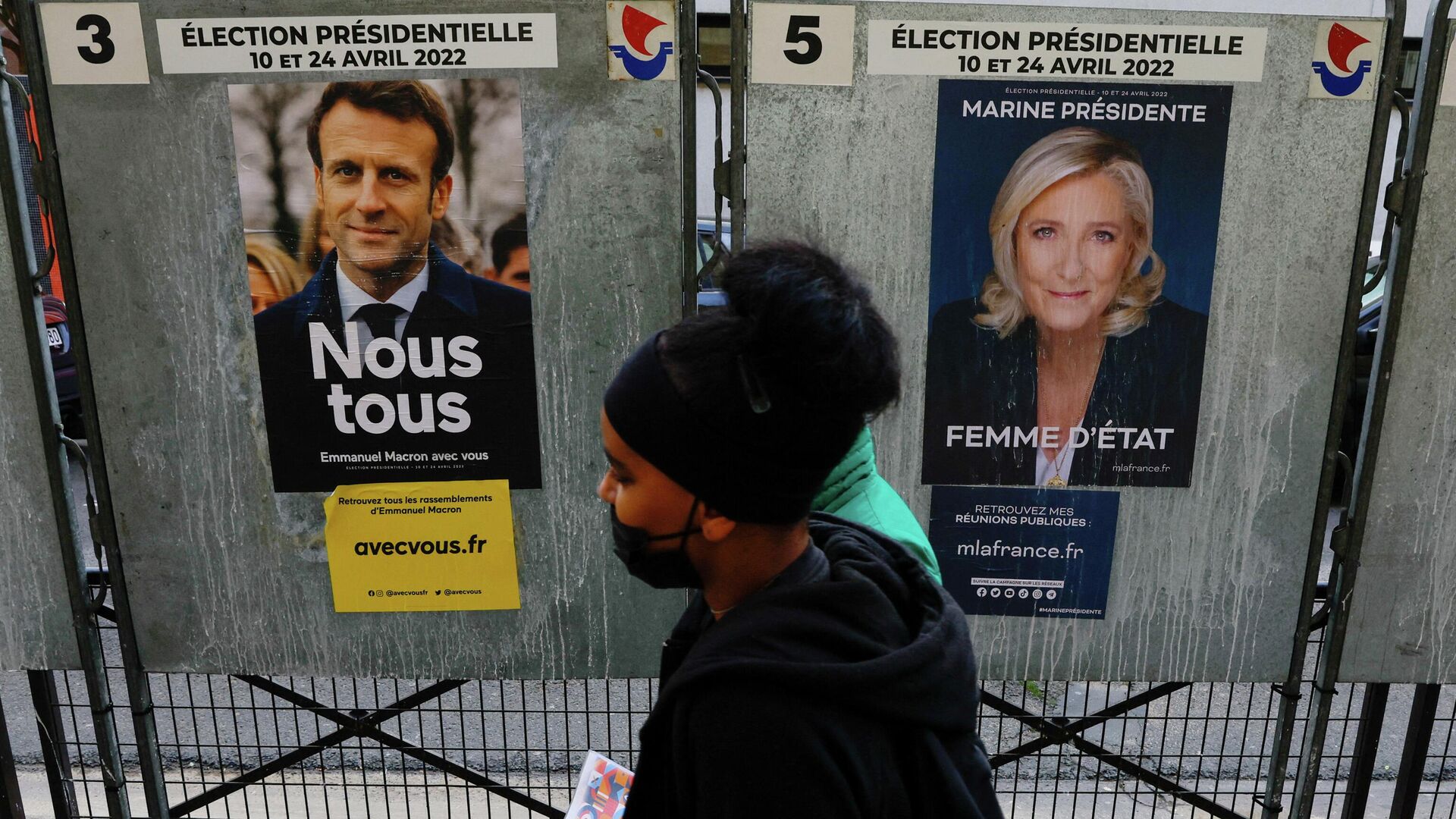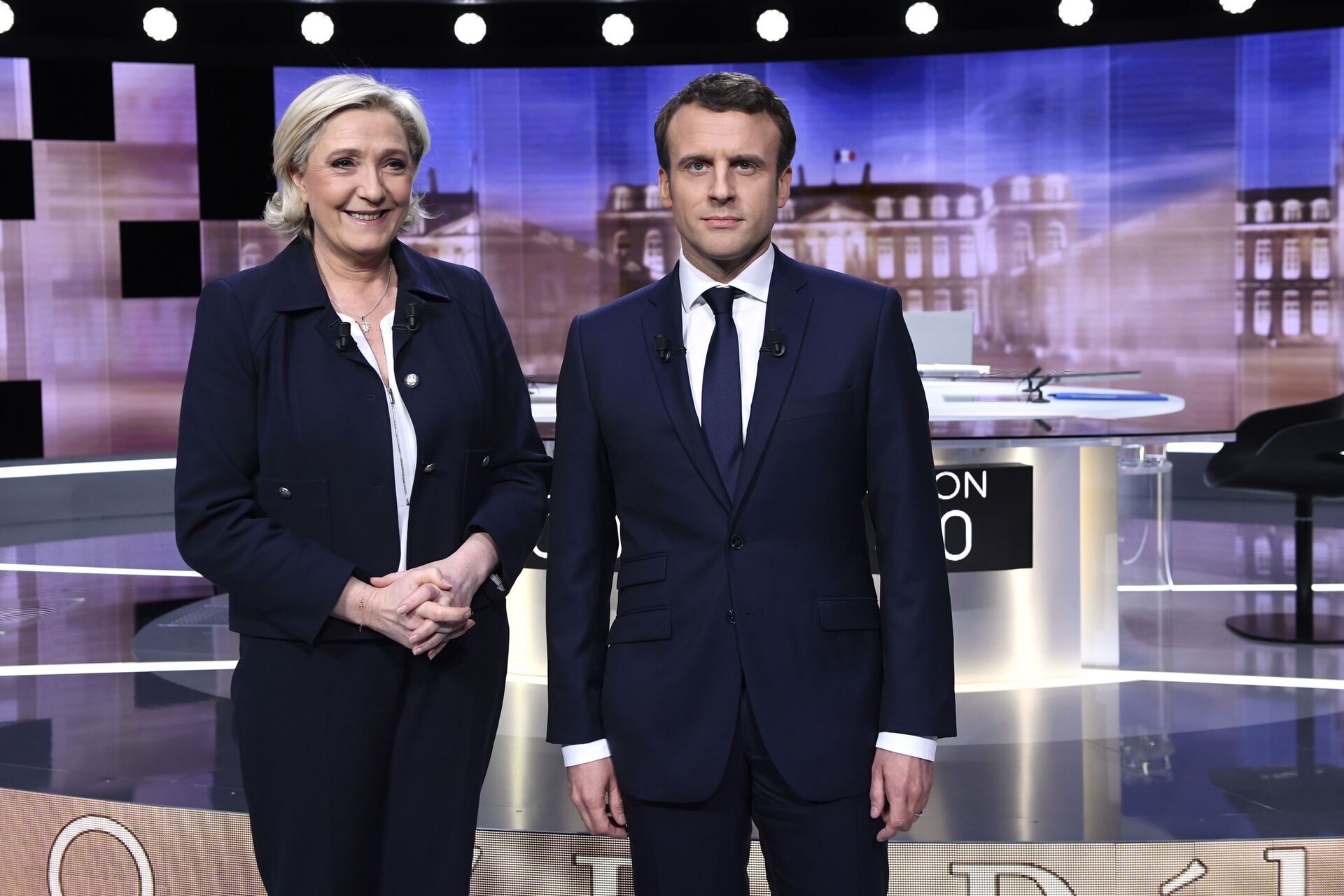https://sputnikglobe.com/20220421/what-does-2022-french-presidential-election-mean-for-israel-and-other-middle-east-countries-1094937451.html
What Does 2022 French Presidential Election Mean for Israel and Other Middle East Countries?
What Does 2022 French Presidential Election Mean for Israel and Other Middle East Countries?
Sputnik International
What Does 2022 French Presidential Election Mean for Israel and Other Middle East Countries?
2022-04-21T10:04+0000
2022-04-21T10:04+0000
2023-01-15T17:25+0000
france
emmanuel macron
marine le pen
elections
israel
https://cdn1.img.sputnikglobe.com/img/07e6/04/0a/1094630772_0:0:3071:1728_1920x0_80_0_0_6a7a5eb0cfca782b074877746878cc91.jpg
Avi Pazner, Israel's former ambassador to France, predicts that Emmanuel Macron has better chances to win the runoff. The sitting president is leading in the polls but his challenger, National Rally leader Marine Le Pen, has managed to narrow the gap. And predictions are that she can count on more than 45 percent of all votes, as opposed to 55.5 percent projected for the current head of state.In Israel, all eyes are also on the upcoming presidential race. Pazner says that if Le Pen wins that battle, she will pose a serious challenge to the Jewish state.No Change in PoliciesFor now, Pazner is betting on Macron, the man Israel has been dealing with for the past five years. Israeli officials are well aware of his policies and the ex-ambassador says they are not expecting any major shifts from his course.After the end of the Algerian war in 1962, then-French president General Charles de Gaulle pushed France to take a pro-Arab stance. That drive was not only motivated by the desire to improve his country's global standing and image, but was also triggered by the need for energy and because Arab nations were willing to buy French arms.As part of that pro-Arab policy France has also taken a supportive position towards the Palestinians, very often at the expense of Israel. It constantly spoke of a two-state solution and condemned the Jewish state for its treatment of the Palestinians. It voted against the country at the United Nations and has even boycotted Israeli products that were manufactured in the West Bank.Rising OpportunitiesThe opportunities the former diplomat refers to are part of the Abraham Accords signed in 2020 between Israel and two Gulf states: the United Arab Emirates and Bahrain.Those normalisation agreements have led to a blossoming trade and a series of lucrative deals between the nations in the spheres of technology, defence, tourism, banking and cyber security.France has been watching these relations from afar. It continued to focus on the Palestinian issue but Pazner is sure that in the long run Paris will open its eyes and adapt to the shifting reality."Paris might not have a choice," reasoned the former ambassador.
france
israel
Sputnik International
feedback@sputniknews.com
+74956456601
MIA „Rosiya Segodnya“
2022
News
en_EN
Sputnik International
feedback@sputniknews.com
+74956456601
MIA „Rosiya Segodnya“
Sputnik International
feedback@sputniknews.com
+74956456601
MIA „Rosiya Segodnya“
what does 2022 french presidential election mean for israel and other middle east countries?
what does 2022 french presidential election mean for israel and other middle east countries?
What Does 2022 French Presidential Election Mean for Israel and Other Middle East Countries?
10:04 GMT 21.04.2022 (Updated: 17:25 GMT 15.01.2023) As the French are bracing for the presidential runoff on 24 April, where Incumbent President Emmanuel Macron will face right-wing candidate Marine Le Pen, Avi Pazner, a former senior Israeli diplomat, has speculated on how the campaign may play out and whether it can change Paris’ policies in the Middle East.
Avi Pazner, Israel's former ambassador to France, predicts that Emmanuel Macron
has better chances to win the runoff. The sitting president is leading in the polls but his challenger,
National Rally leader Marine Le Pen, has managed to narrow the gap. And predictions are that she can count on more than 45 percent of all votes, as opposed to 55.5 percent projected for the current head of state.
In Israel, all eyes are also on the upcoming presidential race. Pazner says that if Le Pen wins that battle, she will pose a serious challenge to the Jewish state.
"Israel has never had any relations with Le Pen's National Rally party," Pazner said. "One of its founders, Marine's father, was openly anti-Semitic. So any dealings with him were out of question, and we still stick to this policy. If she ends up being elected, it will be a whole new ball game".
For now, Pazner is betting on Macron, the man Israel has been dealing with for the past five years. Israeli officials are well aware of his policies and the ex-ambassador says they are not expecting any major shifts from his course.
"He is likely to continue the official policy of France in the Middle East," says Pazner. "Traditionally speaking, that policy presupposed maintaining stable relations with Israel and even better ones with Arab states," he added.
After the end of the Algerian war in 1962, then-French president General Charles de Gaulle pushed
France to take a pro-Arab stance. That drive was not only motivated by the desire to improve his country's global standing and image, but was also triggered by the need for energy and because Arab nations were willing to buy French arms.
As part of that pro-Arab policy France has also taken a supportive position towards the Palestinians, very often at the expense of Israel. It constantly spoke of a two-state solution and condemned the Jewish state for its treatment of the Palestinians. It voted against the country at the United Nations and has even boycotted Israeli products that were manufactured in the West Bank.
"Just as it was before, Macron is very dedicated to the idea of renewing the talks between Israel and the Palestinians [that have been on hold since 2013 - ed.]. This is unlikely to happen but he will probably continue to stick to his somewhat unsuccessful policy, and this means that France will lose opportunities," said Pazner.
The opportunities the former diplomat refers to are part of the Abraham Accords signed in 2020 between Israel and two Gulf states: the United Arab Emirates and Bahrain.
Those normalisation agreements have led to a blossoming trade and a series of lucrative deals between the nations in the spheres of technology, defence, tourism, banking and cyber security.
France has been watching these relations from afar. It continued to focus on the Palestinian issue but Pazner is sure that in the long run Paris will open its eyes and adapt to the shifting reality.
"Paris might not have a choice," reasoned the former ambassador.
"The country is looking to decrease its dependency on Russian energy. And to do so they will need to seek the support of the Gulf. But they will also need Israel and its rich gas reserves. It will not happen soon but in the long run Paris will become more pragmatic," he concluded.





